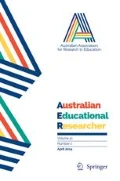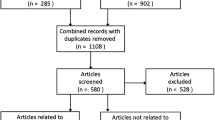Abstract
We present results of a systematic review of empirical research on racism and the schooling experiences of Aboriginal and Torres Strait Islander students, focussing on research published from 1989 to 2016. Our review is part of a series of systematic literature reviews on Aboriginal and Torres Strait Islander education in Australia. It attends to diverse manifestations of racism, from institutional and systemic discrimination to everyday microaggressions, and varying levels of analysis, from individual experiences to cohort approaches. This work adopts a critical perspective on disciplinary boundaries and the outcomes discourse within the broad field of education research. Additionally, we discuss the challenges inherent in systematic review inclusion/exclusion criteria related to racism in a field such as education in which racism and discrimination are frequently misrepresented or misreported, for example, as disciplinary and behaviour management issues, disadvantage or as regional and remote education challenges. The review discusses study types and locations, explores how racism is defined and understood and details the effects of racism on Aboriginal and Torres Strait Islander students.
Similar content being viewed by others
Notes
In this article, we use the terms ‘Aboriginal and Torres Strait Islander’ and ‘Indigenous’ often interchangeably but with recognition both of original source material and the inadequacy of these terms. When referring to specific Indigenous political collectives, we will use their preferred description such as Wurundjeri People and Kulin Nation.
Where findings from a Masters or Doctoral thesis are later published in a peer-reviewed publication, the latter publication was retained.
Where articles are re-published, the earliest peer-reviewed publication was retained.
All other papers in this systematic review project were restricted to research published 2006–2016; whilst that period includes the nationalisation of education policies and the Council of Australian Governments (COAG) endorsement of the ‘Closing the Gap’ policy, this policy change did not explicitly address racism. Racism was clearly stated as key factor in the alienation of Indigenous people from education in the NATSIEP, hence our use of this date range.
References
Blanch, F. R. (2011). Young Nunga males at play and playing up: The look and the talk. Discourse: Studies in the Cultural Politics of Education, 32(1), 99–112.
Bodkin-Andrews, G., & Carlson, B. (2014). The legacy of racism and Indigenous Australian identity within education. Race Ethnicity and Education, 19(4), 784–807.
Bodkin-Andrews, G. H., Denson, N., & Bansel, P. (2013). Teacher racism, academic self-concept, and multiculturation: Investigating adaptive and maladaptive relations with academic disengagement and self-sabotage for Indigenous and non-Indigenous Australian students. Australian Psychologist, 48(3), 226–237.
Bodkin-Andrews, G., O’Rourke, V., Grant, R., Denson, N., & Craven, R. G. (2010a). Validating racism and cultural respect: Testing the psychometric properties and educational impact of perceived discrimination and multiculturation for Indigenous and non-Indigenous students. Educational Research and Evaluation, 16(6), 471–493. https://doi.org/10.1080/13803611.2010.550497.
Bodkin-Andrews, G. H., Seaton, M., Nelson, G. F., Craven, R. G., & Yeung, A. S. (2010b). Questioning the general self-esteem vaccine: General self-esteem, racial discrimination, and standardised achievement across Indigenous and non-Indigenous students. Australian Journal of Guidance and Counselling, 20(1), 1–21.
Coffin, J., Larson, A., & Cross, D. (2010). Bullying in an Aboriginal context. Australian Journal of Indigenous Education, 39, 77–87.
Crawford, K. (2013). Constructing Aboriginal Australians, 1930–1960 projecting false memories. Journal of Educational Media, Memory, and Society, 5(1), 90–107.
Dandy, J., et al. (2015). Academic expectations of Australian students from Aboriginal, Asian and Anglo backgrounds: Perspectives of teachers, trainee-teachers and students. International Journal of Disability, Development and Education, 62(1), 60–82.
Day, A. (1992). Aboriginal students succeeding in the senior high school years: A strengthening and changing Aboriginality challenges the negative stereotype. Australasian Journal of Gifted Education, 1(2), 14–26.
Department of Employment, Education and Training. (1989). National Aboriginal and Torres Strait Islander education policy: Joint policy statement. Canberra, Author. Retrieved from: http://hdl.voced.edu.au/10707/81579.
Duncan, B. J. (1990). The integration of Aboriginal and Torres Strait Islander primary and secondary students within non-government boarding schools in Queensland. St Lucia, QLD: Aboriginal and Torres Strait Islanders Studies Unit, University of Queensland.
Eckerman, A. (1999). Aboriginal education in rural Australia: A case study in frustration and hope. Australian Journal of Education, 43(1), 5–23.
Edwards-Groves, C. (2008). Enabling voice: Perceptions of schooling from rural Aboriginal youth at risk of entering the juvenile justice system. Australian Journal of Indigenous Education, 37, 165–177.
Foley, D. (2000). Aboriginality? The plight of the fair-skinned Indigenous Australian student in the secondary school system. Paper presented at the Aboriginal studies: Self-concept for a nation: Collected papers of the 10th annual ASA Conference., University of Western Sydney, Bankstown Campus, Milperra 12–14 July.
Gool, S., & Patton, W. (1998). Voices still to be heard. Australian Journal of Indigenous Education, 26(1), 1–7.
Graham, L. J. (2012). Disproportionate over-representation of Indigenous students in New South Wales government special schools. Cambridge journal of education, 42(2), 163–176.
Groome, H. (1990). What do Aboriginal parents think about schools? Kaurna Higher Education Journal, 1, 47–54.
Hardy, I. (2016). ‘Capitalising’ on community? Understanding and critiquing instrumentalist approaches to Indigenous schooling. Oxford Review of Education, 42(6), 661–676.
Healy, S. (2015). Race, citizenship and national identity in The School Paper, 1946–1968. History of Education Review, 44(1), 5–22.
Helme, S. (2005). Indigenous students and vocational education and training in schools: Ladder of opportunity or corrugated iron ceiling? Australian Journal of Education, 49(2), 169–181.
Herbert, J., Anderson, L., Price, D., & Stehbens, C. (1999). If they learn us right…: A study of the factors affecting the attendance, suspension and exclusion of Aboriginal students in secondary schools. Erskineville, NSW: Australian Centre for Equity through Education.
Hewitson, R. (2007). Climbing the educational mountain: A metaphor for real culture change for Indigenous students in remote schools. The Australian Journal of Indigenous Education, 36(1), 6–20.
Hickey, C. (2010). Racism at school. Independent Education, 40(3), 19–20.
Kaplan, G., & Eckermann, A.-K. (1996). Identity and culture shock: Aboriginal children and schooling in Australia. McGill Journal of Education, 31(1), 7–24.
Keddie, A. (2011). “Much more than a basic education”: Supporting self-determination and cultural integrity in a non-traditional school for Indigenous girls. International Journal of Inclusive Education, 15(9), 1001–1016.
Keddie, A. (2013). Schooling for self-determination through a justice politics of Indigenous representation. International Journal of Qualitative Studies in Education, 26(1), 21–38.
Keddie, A., Gowlett, C., Mills, M., Monk, S., & Renshaw, P. (2013). Beyond culturalism: Addressing issues of Indigenous disadvantage through schooling. Australian Educational Researcher, 40(1), 91–108.
Keddie, A., & Williams, N. (2012). Mobilising spaces of agency through genealogies of race and gender: Issues of indigeneity, marginality and schooling. Race Ethnicity and Education, 15(3), 291–309.
Khan, K. S., Kunz, R., Kleijnen, J., & Antes, G. (2003). Five steps to conducting a systematic review. Journal of the Royal Society of Medicine, 96(3), 118–121.
Long, A. F., & Godfrey, M. (2004). An evaluation tool to assess the quality of qualitative research studies. International Journal of Social Research Methodology, 7(2), 181–196.
Malin, M. (1990). The visibility and invisibility of Aboriginal students in an urban classroom. Australian Journal of Education, 34(3), 312–329.
Mander, D. J., Cohen, J., & Pooley, J. A. (2015). A critical exploration of staff perceptions of Aboriginal boarding students’ experiences. Australian Journal of Education, 59(3), 312–328.
Mansouri, F., & Jenkins, L. (2010). Schools as sites of race relations and intercultural tension. Australian Journal of Teacher Education, 35(7), 93–108.
Mansouri, F., Jenkins, L. M., Morgan, L., & Taouk, M. (2009). The impact of racism upon the health and wellbeing of young Australians. Retrieved from https://www.fya.org.au/app/theme/default/design/assets/publications/Impact_of_Racism_FYA_report.pdf.
Mansouri, F., Jenkins, L., & Walsh, L. (2012). Racism and its impact on the health and wellbeing of Australian youth: Empirical and theoretical insights. Education and Society, 30(1), 75–94.
Martino, W. (2003). ‘We just get really fired up’: Indigenous boys, masculinities and schooling. Discourse, 24(2), 159–174. https://doi.org/10.1080/0159630032000110711.
Matthews, J., & Aberdeen, L. (2004). Racism, racialisation and settler colonialism. In A. Hickling-Hudson, J. Matthews, & A. Woods (Eds.), Disrupting preconceptions: Postcolonialism and education (pp. 193–209). Flaxton, Qld: Post Pressed.
McGloin, C. (2014). Tone it down a bit!: Euphemism as a colonial device in Australian Indigenous Studies. Review of Education, Pedagogy, and Cultural Studies, 36(2), 156–167.
Michaelson, M. T. (2006). A measure of the strength of the relationship between the Indigenity and desirability of Queensland state schools. Australian Journal of Indigenous Education, 35, 54–60.
Mills, K. A. (2006). ‘Mr Travelling-at-will Ted Doyle’: Discourses in a multiliteracies classroom. Australian Journal of Language and Literacy, 29(2), 132–149.
Mohajer, N., Bessarab, D., & Earnest, J. (2009). There should be more help out here! A qualitative study of the needs of Aboriginal adolescents in rural Australia. Rural and Remote Health, 9(2), 1137.
Morgan, G. (2006). Memory and marginalisation: Aboriginality and education in the assimilation era. Australian Journal of Education, 50(1), 40–49.
Nelson, A., & Hay, P. J. (2010). “I don’t want to grow up and not be smart”: Urban Indigenous young people’s perceptions of school. Australian Journal of Indigenous Education, 39, 54–64.
Paki, D. (2010). What do primary school principals from the Yamaji region or Mid West Education District say about their school’s bullying prevention and management guidelines and practices and how they support the strengths and needs of Aboriginal students and their families? Joondalup WA: Edith Cowan University.
Partington, G., Godfrey, J., & Richer, K. (2001). ‘The principal is hopeless. She needs a good boot in the rear end’: Cultural diversity and conflicting school agendas. Paper presented at the AARE Annual Conference, Fremantle. Retrieved from http://www.aare.edu.au/data/publications/2001/par01107.pdf.
Priest, N. C., Paradies, Y. C., Gunthorpe, W., Cairney, S. J., & Sayers, S. M. (2011). Racism as a determinant of social and emotional wellbeing for Aboriginal Australian youth. Medical Journal of Australia, 194(10), 546–550.
Purdie, N., Oliver, R., Collard, G., & Rochecouste, J. (2002). Attitudes of primary school Australian Aboriginal children to their linguistic codes. Journal of Language and Social Psychology, 21(4), 410–421. https://doi.org/10.1177/026192702237957.
Rigney, D., Hughes, P., & Rigney, L.-I. (1998). Report on Aboriginal students and the South Australian Certificate of Education (SACE). Wayville, SA: Senior Secondary Assessment Board of South Australia.
Russell, D. (1999). The importance of identity in the retention and attainment of Aboriginal students at secondary school: Some research findings. Australian Journal of Indigenous Education, 27(1), 10–19.
Sanderson, V., & Allard, A. (2003). ‘Research as dialogue’ and cross-cultural consultations: Confronting relations of power. Australian Educational Researcher, 30(1), 19–39.
Sarra, G. (2008). Cherbourg state school in historical context. Australian Journal of Indigenous Education, 37, 108–119.
Simpson, L., McFadden, M., & Munns, G. (2001). ‘Someone has to go through’: Indigenous boys, staying on at school and negotiating masculinities. In W. Martino & B. Meyenn (Eds.), What about the boys? Issues of masculinity in schools (pp. 154–168). Buckingham: Open University Press.
Smith, L. T. (2012). Decolonizing methodologies: research and indigenous peoples (2nd ed). London ; New York: Zed Books : Distributed in the USA exclusively by Palgrave Macmillan.
Tarbetsky, A. L., Collie, R. J., & Martin, A. J. (2016). The role of implicit theories of intelligence and ability in predicting achievement for Indigenous (Aboriginal) Australian students. Contemporary Educational Psychology, 47, 61–71.
Vass, G. (2014). The racialised educational landscape in Australia: Listening to the whispering elephant. Race Ethnicity and Education, 17(2), 176–201.
Wall, K., & Baker, M. (2012). Race and education: Hidden links between media and Indigenous academic self-concept. Journal of Student Engagement: Education Matters, 2(1), 54–63.
Welch, V., Petticrew, M., Tugwell, P., Moher, D., O’Neill, J., Waters, E., et al. (2012). PRISMA-equity 2012 extension: Reporting guidelines for systematic reviews with a focus on health equity. PLoS Med, 9(10), e1001333. https://doi.org/10.1371/journal.pmed.1001333.
Wilkinson, E. L. (2005). Audacious leadership: One school’s journey to achieve educational equality for Indigenous students. Townsville, QLD: James Cook University.
Wooltorton, T. (1997). Nyungar education in a south west Australian location: A perspective. Australian Journal of Indigenous Education, 25(2), 37–42.
Author information
Authors and Affiliations
Corresponding author
Additional information
Publisher's Note
Springer Nature remains neutral with regard to jurisdictional claims in published maps and institutional affiliations.
Rights and permissions
About this article
Cite this article
Moodie, N., Maxwell, J. & Rudolph, S. The impact of racism on the schooling experiences of Aboriginal and Torres Strait Islander students: A systematic review. Aust. Educ. Res. 46, 273–295 (2019). https://doi.org/10.1007/s13384-019-00312-8
Received:
Accepted:
Published:
Issue Date:
DOI: https://doi.org/10.1007/s13384-019-00312-8








